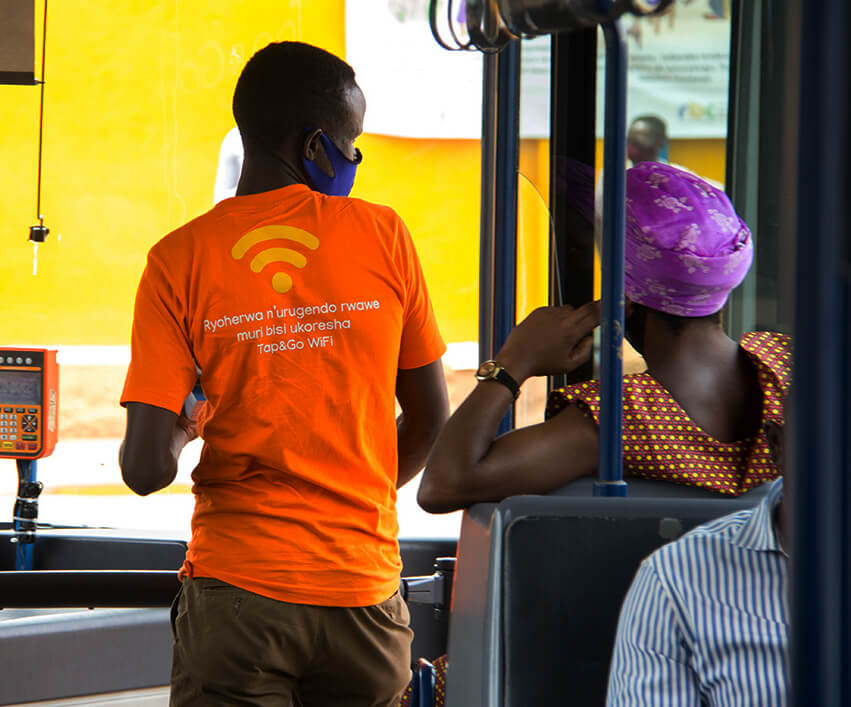
This week,in a surprising move, transport authorities announced that the wireless internet connectivity, commonly known as 4G Long Term Evolution (LTE) was being re-introduced on all Kigali public transport buses.
Jean de Dieu Uwihanganye, the Minister of State in for Transport tweeted on Thursday, saying that “4G internet is back on Kigali Public Transport Buses”.
He said that at least 50 per cent of all buses in the city of Kigali have been installed with new better routers.
“Progressive installation shall continue and we expect to reach 100 per cent by August. Enjoying a Kigali ride in a bus. Tweeting from a Bus that is moving from Kimironko towards Downtown,” he said.
The free internet connection was introduced in buses in 2015 as part of the broad Smart Kigali Initiative, but the project flopped after the government stopped the then service provider after series of complaints from people who experienced years of poor service.
By then, Rwanda Utilities Regulatory Authority (RURA) had said the Wi-Fi connectivity system failed after the installed wireless devices were incompatible with the fleet, among other challenges.
Telecom Network Solution Providers Ltd (TNSP) which was providing internet on public buses lost its contract in 2016, and the Government directed that more research be done so that people get a better experience.
In an interview with Sunday Times, the state minister for transport reaffirmed the development to reinstall the broadband connection, highlighting that they had conducted several surveys on several buses before re-introducing the wireless connectivity.
“We are assured that it will work because we have taken enough time to re-study the project. What we found out is that previous routers were quite weak and were not able to adapt to Kigali terrain,” he said, adding that they also revised the financing model of the internet which he believes will be sustainable and fair to all the operators.
The minister also highlighted that they spend nearly five months conducting ground studies before taking the final decision to reinstall 4G on public service buses.
AC Group secure deal
According to Uwihanganye, the Government contracted AC Group to reinstall the broadband connection on all public buses, and he argued that they were in good position to make it work better.
AC Group is a technology firm popularly known for the Tap&Go system, which currently enables nearly a million passengers in the City of Kigali to commute and make payments using smart cards.
AC Group’s Marketing and Communications Manager, Sharon Munyana told Sunday Times that they were a lot of on-going work to make sure that bus passengers begin to enjoy a good experience with free connectivity.
“The wireless devices we are rolling out are able to accommodate a big number of people and any bandwidth of internet. Basically, a number of adjustments have been made and that is why we believe people will get a better experience and benefit them,” she said.
There are nearly 500 public transport buses in the city owned by Rwanda Federation of Transport Cooperatives (RFTC), Kigali Bus Services and Royal Express.
Munyana said that they connected half of the buses with hope of completing the exercise on all buses in the next two months.
The tech company has been conducting field surveys to enhance the experience of the passengers since November last year.
According to them, throughout the testing phase they made choices on the device, internet speed, and up-time maximization.
The firm is currently working as a service retailer through Korea Telecom Networks (KTRN), which is the main wholesaler of 4G LTE internet in the country.
On whether the cost of investment in the project might cause an increase in transport fare, the minister said that they don’t intend to do so; instead the cost will be incorporated in the transport fare.
It is not yet clear how much transport operators will be paying, but previously the cost of internet on each bus was between Rwf150,000 and Rwf200,000. Many operators were not happy by the cost though.
Under the Smart Kigali Initiative which was launched back in 2013, the city authorities have a bigger aim of connecting free internet connectivity in most of public places, including schools, bus stations, and hospitals, among others.